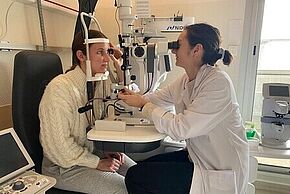Accueil, Divers
Vous souhaitez ne plus porter de lunettes ou de lentilles ?
2 documents Published on

POLE NEUROSCIENCES TETE ET COU
Since 2005, 13,000 Boston keratoprostheses have been implanted worldwide.
The Boston keratoprosthesis essentially consists of a mushroom-shaped plastic (PMMA) optical cylinder that acts like a lens, around which a donor cornea is placed. At the back, a titanium backplate prevents the cornea from detaching from the optic.
The indications for Boston keratoprostheses include corneal diseases with dense opacities where a corneal graft would not work or would be rapidly rejected.
Conditions that may benefit from a Boston Keratoprosthesis include : multiple failed corneal grafts, limbal stem cell deficiency, aniridia, corneal neovascularization and ocular burns
Visual outcomes are generally very good in the absence of complications.
Vidéo : Kératoprothèse de Boston, indications et technique chirurgicale
Vidéo : Cours Kératoprothèse de Boston
Accueil, Divers
2 documents Published on
Prévention-éducation
PDF - 419,4 Ko

